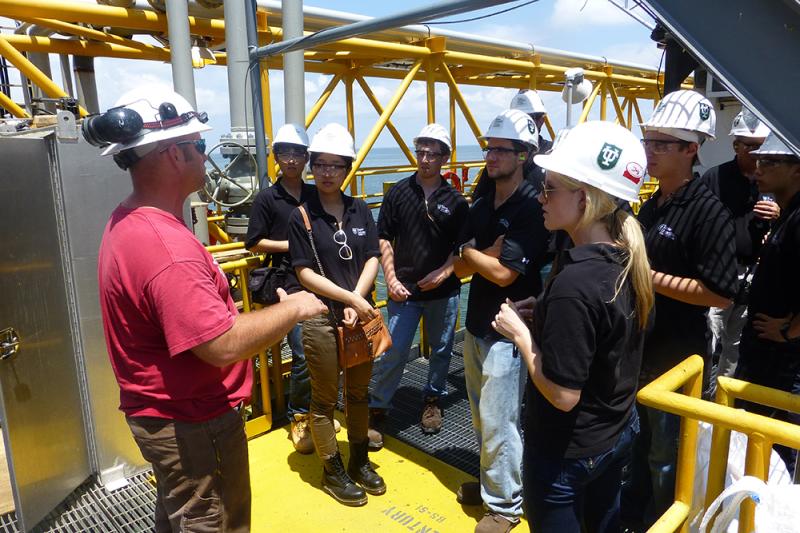MME employment at graduation hits all-time high

Ninety-three percent of this year’s Master of Management in Energy class had job offers at graduation, the highest percentage in program history.
Matthew Coscino (MME ’21) knows energy. In his year and a half in the Freeman School’s Master of Management in Energy program, he visited a solar farm, learned the intricacies of a gas turbine and mastered energy trading in Freeman’s simulated trading room, pushing himself through the challenge with teamwork.
And that was in addition to his traditional coursework.
Now, he’s using those experiences as a financial analyst at IMTT, a New Orleans-based bulk liquid storage company.
“The things I do today on a daily basis are things I was doing in the MME program,” Coscino said. “There’s a direct carryover from the program to my current job and responsibilities.”
Master of Management in Energy students have long had success in landing jobs with leading energy companies, but this year’s graduates are among the most successful yet. Ninety-three percent of this year’s class had job offers at graduation, the highest percentage in program history.
Pierre Conner, executive director of the Tulane Energy Institute, which oversees the MME program, said there are a few reasons why graduates are in such high demand.
First, the fast-growing energy sector attracts capital – and where there’s capital, there are jobs.
But Freeman also offers a curriculum developed in partnership with industry experts to broaden the appeal of graduates to the hiring base. In addition to a comprehensive overview of the business of oil and gas, it includes specializations like renewable energy that expand on students’ knowledge of energy forms with an eye to the future.
“We’re not just educating for today, we’re educating for the energy professional over the course of their career,” Conner said.
The Tulane Energy Institute also offers unique opportunities for students.
“One of our differentiators is that we focus exclusively on the business of energy,” Conner said. “Because we’re based in the Freeman School, we can leverage Freeman’s longstanding excellence in traditional business disciplines — finance, accounting, analytics — and apply it to an energy context. The result is that our students end up with a much wider range of career options, everything from oil and gas finance, energy trading and renewables development to investment banking, private equity and investment management.”
Conner said graduates like Coscino are promoted as much as two years sooner than peers without MME experience.
But MME graduates do more than rise through the ranks. Dale Klamfoth, executive director of Freeman’s Career Management Center, said they also become advocates, building awareness of the program within their organizations and working with Freeman on energy-related initiatives.
“They often come back and hire other students,” he said. “It’s very, very common.”
Freeman faculty also contribute to the MME experience, connecting their students with networks built through decades of work in the industry.
Yvette Burcescu (MME ’22), who joined utility-scale solar and storage project developer Recurrent Energy in June as a financial analyst, said those networks help students get jobs.
“I've had professors specifically tell me, ‘This role looks great for you and I have a friend that works there if you want some additional information,’” she said. “So they would kind of tailor their options to their students.”
On her graduation day, Burcescu said her peers congratulated her and gave her a reassuring message that the MME network would always support her: “Remember, this lasts for the rest of your career.”
--Martha Sanchez (SLA ’24)
Interested in advancing your education and/or career? Learn more about Freeman’s wide range of graduate and undergraduate programs. Find the right program for you.
Other Related Articles
- Politico: Trump administration moves closer to opening Venezuela to more US oil producers
- Alumna leverages Freeman network to land dream job at Entergy
- Jobs fuel growth of MME program
- Tulane Energy Institute gets major gift from Templeton family, new name for Trading Center
- WVUE Fox 8: How the Middle East conflict is affecting oil prices
- WDSU: Gas prices face uncertainty after US strikes on Iran
- Four honored with Freeman research awards
- NOLA.com: Hydrogen could be a key resource to fueling Louisiana's future. Here's how.
